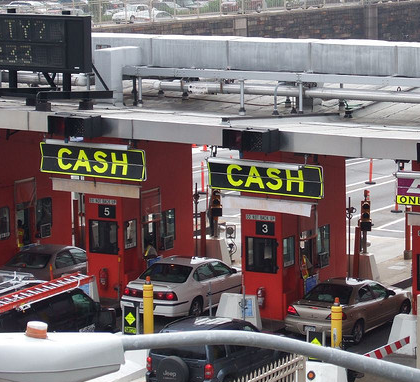The MTA capital program, which funds maintenance and expansion of the transit system, is on the final year of its five-year cycle. A new plan is being developed, and the big question is how the state is going to pay for it. At a hearing of the Assembly Committee on Corporations, Authorities and Commissions, state legislators got briefed on the need to plug the enormous funding gap in the next capital program. At the same time, one State Senator is trying to create a new tax incentive to drive.

The MTA has been increasingly relying on debt to finance its capital program -- 60 percent of the most recent capital program used borrowed money -- and that burden leads to higher fares for straphangers.
The MTA is setting aside $370 million annually for its capital program beginning next year, but an agency official told the Assembly committee today that it was just "a drop in the bucket" of the authority's total needs, which are likely to exceed $5 billion annually for everything from new buses to expansion projects like Metro-North stations in the eastern Bronx.
"The 2015-2019 capital program is essentially unfunded. We’re one short year away and we don’t know where most of the money is coming from," said Craig Stewart, the MTA's senior director of capital programs. "We’re going to need your support."
MTA officials deferred to the legislature to come up with a funding scheme, but advocates at today's hearing backed the Move NY fair tolling plan, which aims to reduce tolls on outer-borough crossings while creating a uniform toll to drive into Manhattan below 60th Street. The proposal, which would raise $1.5 billion annually, much of it to fund the MTA capital program, received a friendly but non-committal response from most of the Assembly members on the panel.
While Assembly members, advocates, and MTA officials were discussing a nuanced response to the state's transportation funding crisis, State Senator David Carlucci unveiled his latest proposal today in Rockland County: A tax cut for drivers who pay tolls.
Carlucci, a member of the Independent Democratic Conference, hopes to enact his $250 state income tax credit -- part of the IDC's "Affordable New York" agenda -- through legislative budget negotiations. The tax credit wouldn't actually save New Yorkers money -- it would probably just shift costs from drivers to general taxpayers. Carlucci's office said it wasn't sure how much the plan would end up costing or how it would be paid for.
Back in the Assembly, committee members wrestled with the MTA's funding needs.
"We’ve cut more than $800 million of annually recurring costs over the past several years," MTA chief financial officer Bob Foran told the panel, but he warned that without concessions from labor unions, rising pension and healthcare costs threatened to swamp what savings the authority had achieved. "If it sounds like I’m trying to raise an alarm, I guess I really am," he said.
The capital program has higher costs ahead, as well: In response to increased pressure after last month's deadly Metro-North derailment, the MTA is planning an additional $400 million expenditure on Positive Train Control in its next capital plan, and post-Sandy repair and resiliency initiatives, though covered primarily through the federal government, will also require additional state funds.
While Assembly members recognized the agency's need for funding, some also focused on improving the agency's practices. James Brennan, who chairs the committee, asked about the agency's reliance on consultants and cost and schedule overruns on mega-projects like East Side Access, the project to bring Long Island Rail Road service to Grand Central Terminal.
On that front, there was bad news: Preliminary results from a consultant's report indicated there are more cost overruns and delays on the way for the project. "It is slipping a little further and it could cost more," Stewart said.
Given the escalating costs of large rail expansions and the immediate need for transit improvements, particularly in areas not well-served by the subway, advocates have focused on securing an aggressive rollout of Bus Rapid Transit projects. They were joined today by Assembly Member Nily Rozic, who said she wanted to see Select Bus Service and BRT in her eastern Queens district.
Not all lawmakers were as enthusiastic. “You’re talking about taking lanes away from already-congested streets. The problem is that there are cars that just can’t be moved," said Assembly member Phil Goldfeder. "You’re not going to increase public transit use." A backer of re-establishing rail service on the Rockaway Beach line, Goldfeder urged advocates to support that project, which he said would have more permanence as transit infrastructure.
Advocates did not commit support to Rockaway Beach reactivation, and defended their interest in dedicated busways. "We see Select Bus Service and Bus Rapid Transit as providing that improved service so as people don’t have to drive," Tri-State Transportation Campaign Executive Director Veronica Vanterpool said.
“I do want to ask you not to be dismissive of buses as infrastructure," Riders Alliance Executive Director John Raskin said, pointing out that upgrading major bus corridors "makes an enormous difference for riders."
One proposal that did receive near-unanimous support from legislators today: Requiring employers of a certain size to offer pre-tax transit benefits to their employees. Such a law, modeled on a San Francisco mandate for all businesses with 20 or more employees, could be enacted at the city or state level, Raskin said.





